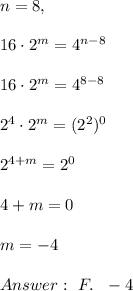If n = 8 and 16 · 2^m = 4^(n – 8), then m = ?
f. –4
g. –2
h. 0
j. 1
k...

Mathematics, 20.08.2019 05:50 meganwintergirl
If n = 8 and 16 · 2^m = 4^(n – 8), then m = ?
f. –4
g. –2
h. 0
j. 1
k. 8

Answers: 2


Other questions on the subject: Mathematics

Mathematics, 21.06.2019 18:30, yeet6942000
Complex numbers multiply √-4 * √-25 and show all intermediate steps. alternative notation is sqrt(-4) * sqrt(-25).
Answers: 1

Mathematics, 21.06.2019 20:30, maxy7347go
Does the function satisfy the hypotheses of the mean value theorem on the given interval? f(x) = 4x^2 + 3x + 4, [−1, 1] no, f is continuous on [−1, 1] but not differentiable on (−1, 1). no, f is not continuous on [−1, 1]. yes, f is continuous on [−1, 1] and differentiable on (−1, 1) since polynomials are continuous and differentiable on . there is not enough information to verify if this function satisfies the mean value theorem. yes, it does not matter if f is continuous or differentiable; every function satisfies the mean value theorem.
Answers: 1

Mathematics, 21.06.2019 21:00, kordejah348
Sweet t saved 20 percent of the total cost of the green-eyed fleas new album let there be fleas on earth. if the regular price is $30 how much did sweet save
Answers: 1

Mathematics, 21.06.2019 21:30, noelia2001guzman
Madeline takes her family on a boat ride. going through york canal, she drives 6 miles in 10 minutes. later on as she crosses stover lake, she drives 30 minutes at the same average speed. which statement about the distances is true?
Answers: 3
You know the right answer?
Questions in other subjects:









Mathematics, 22.10.2019 02:00




